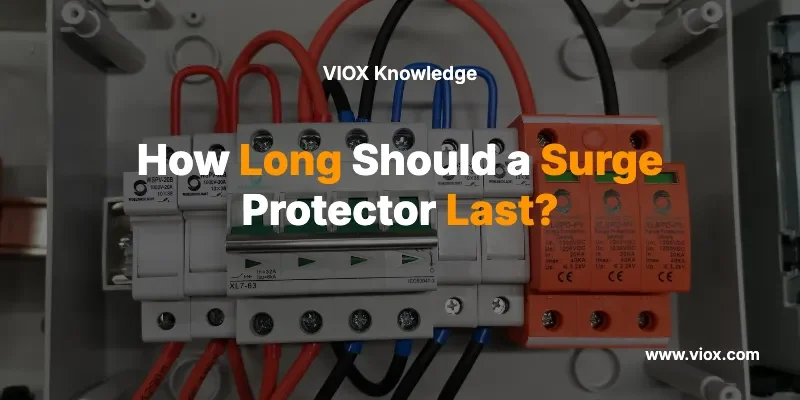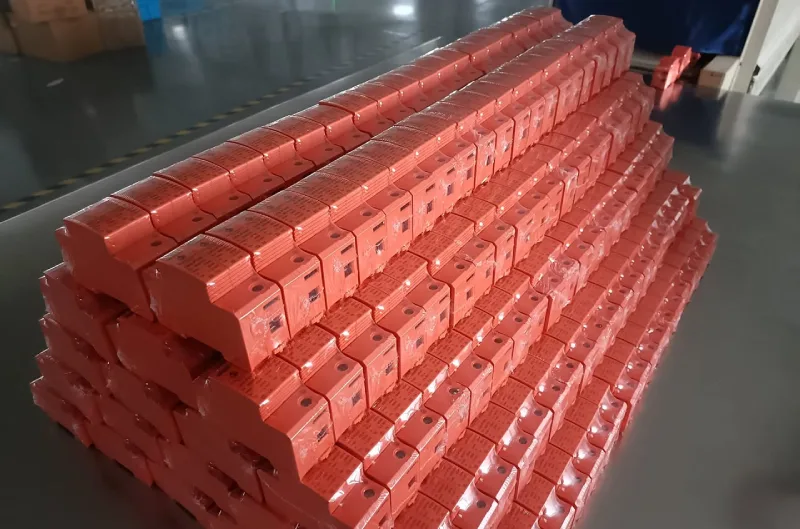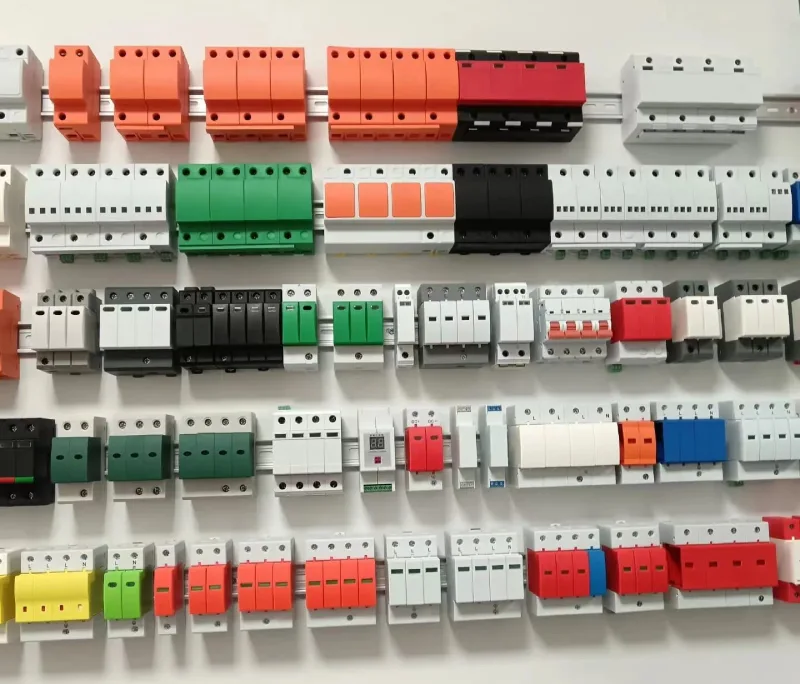A legtöbb túlfeszültségvédőt normál használati körülmények között 3-5 évente ki kell cserélni, bár ez jelentősen változhat a tapasztalt túlfeszültségek számától, a készülék minőségétől és a környezeti tényezőktől függően. A kiváló minőségű, 2000 joule feletti joule értékkel rendelkező túlfeszültségvédők általában hosszabb ideig bírják, mint az alapmodellek.
A túlfeszültségvédő élettartamának megértése kulcsfontosságú az értékes elektronikai eszközök védelméhez és az elektromos biztonság fenntartásához otthonában vagy irodájában. Ez az átfogó útmutató segít meghatározni, mikor kell kicserélnie a túlfeszültségvédőt, és hogyan maximalizálhatja annak védelmi élettartamát.
Mi határozza meg a túlfeszültségvédő élettartamát?
A túlfeszültségvédők nem egyszerűen kopnak el az idő múlásával, mint a mechanikus eszközök. Ehelyett védelmi kapacitásuk fokozatosan csökken minden egyes elnyelt túlfeszültséggel. A kulcsfontosságú alkatrész, a Fém-Oxid Varistor (MOV), fokozatosan romlik, amíg már nem tud megfelelő védelmet nyújtani.
Az élettartamot befolyásoló kulcsfontosságú tényezők
Túlfeszültség gyakorisága és intenzitása: Minden egyes túlfeszültség, amelyet a védő elnyel, csökkenti a fennmaradó kapacitását. A gyakori elektromos viharokkal vagy instabil elektromos hálózatokkal rendelkező területeken több a túlfeszültség.
Joule Értékelés: A magasabb joule értékek nagyobb túlfeszültség-elnyelési kapacitást jeleznek, mielőtt a készülék elveszítené hatékonyságát. A minőségi egységek jellemzően 1000 és 4000+ joule közöttiek.
Gyártási minőség: A prémium túlfeszültségvédők magasabb minőségű alkatrészeket és jobb hőelvezetést használnak, ami jelentősen meghosszabbítja az élettartamot.
Környezeti feltételek: A hő, a páratartalom és a por felgyorsíthatja az alkatrészek lebomlását és csökkentheti az élettartamot.
Túlfeszültségvédő élettartam összehasonlító táblázat
| Túlfeszültségvédő típusa | Tipikus élettartam | Joule érték tartomány | Cserejelzők | Legjobb felhasználási esetek |
|---|---|---|---|---|
| Alapvető elosztók | 1-2 év | 200-800 joule | Nincs jelzőfény | Ideiglenes/alacsony értékű elektronikai eszközök |
| Standard otthoni egységek | 3-5 év | 1000-2000 joule | LED állapotjelzők | Otthoni irodák, szórakoztató központok |
| Prémium lakossági | 5-8 év | 2000-4000 joule | Digitális kijelzők, riasztók | Nagy értékű elektronikai eszközök, egész szobák |
| Kereskedelmi/ipari | 8-15 év | 4000+ joule | Monitoring rendszerek | Kritikus berendezések, adatközpontok |
| Egész házas védők | 10-25 év | 40 000+ joule | Professzionális felügyelet | Teljes otthoni elektromos panel |
Honnan tudhatja, hogy a túlfeszültségvédőt ki kell cserélni
Vizuális és elektronikus jelzők
Állapotjelző fények változásai: A legtöbb minőségi túlfeszültségvédő LED-es jelzőfényeket tartalmaz, amelyek színe megváltozik vagy kikapcsol, ha a védelem sérül. A piros fény vagy a fény hiánya általában cserét jelent.
Fizikai sérülés jelei:
- Repedt vagy sérült ház
- Égési nyomok vagy elszíneződések
- Laza vagy sérült aljzatok
- Kopott tápkábelek
Teljesítménymutatók:
- Aljzatok, amelyek nem tartják biztonságosan a dugókat
- Szakaszos áramellátás
- Szokatlan hőtermelés normál használat során
- Furcsa szagok működés közben
Biztonsági figyelmeztetés: Soha ne használjon tovább olyan túlfeszültségvédőt, amely fizikai sérülést vagy égési nyomokat mutat. Ezek a jelek potenciális tűzveszélyt jeleznek, és azonnali cserét igényelnek.
Kor alapú csere irányelvek
Azonnal cserélje ki, ha:
- A készülék 10 évnél idősebb, állapotától függetlenül
- Nincsenek látható védelmi jelzőfények
- Bármilyen fizikai sérülés vagy túlmelegedés jele
Fontolja meg a cserét, ha:
- 3-5 éves, erős használat mellett
- A védelmi fény leromlott állapotot mutat
- Gyakori áramproblémákkal küzdő területen található
Túlfeszültségvédő értékelési folyamat lépésről lépésre
1. Ellenőrizze a védelmi állapotjelzőket
Keressen LED-es lámpákat vagy digitális kijelzőket, amelyek mutatják a védelmi állapotot. A zöld általában jót jelent, a sárga/narancssárga leromlottat, a piros vagy a fény hiánya pedig azonnali cserét jelent.
2. Vizsgálja meg a fizikai állapotot
Vizsgálja meg az egész egységet repedések, égési nyomok, laza aljzatok vagy bármilyen sérülés jele szempontjából. Különös figyelmet fordítson a tápkábelre és a csatlakozódugókra.
3. Tekintse át a kort és a használati előzményeket
Számítsa ki a készülék korát, és vegye figyelembe, hogy hány jelentős áramszünetet (vihar, áramkimaradás) élt át. Az erős túlfeszültség-tevékenység felgyorsítja a kopást.
4. Tesztelje az aljzat működését
Győződjön meg arról, hogy minden aljzat biztonságosan tartja a dugókat és egyenletes áramellátást biztosít. A laza aljzatok belső alkatrész kopásra utalnak.
5. Ellenőrizze a visszahívási információkat
Ellenőrizze, hogy a modelljét nem hívták-e vissza a gyártó weboldalán vagy a Consumer Product Safety Commission adatbázisában.
Szakértői tippek a túlfeszültségvédő élettartamának maximalizálásához
Válassza a minőséget az ár helyett: Fektessen be 2000 joule feletti névleges értékű és UL 1449 tanúsítvánnyal rendelkező egységekbe a jobb élettartam és védelem érdekében.
Figyelje a környezeti feltételeket: Tartsa a túlfeszültségvédőket hűvös, száraz helyen, távol hőforrásoktól és közvetlen napfénytől.
Rendszeres ellenőrzési ütemterv: Havonta ellenőrizze a védelmi jelzőket, és negyedévente végezzen teljes ellenőrzést.
Dokumentálja a túlfeszültség eseményeket: Vezessen nyilvántartást a nagyobb áramkimaradásokról vagy viharokról, hogy nyomon követhesse a védelmi eszközök kumulatív terhelését.
Szakmai értékelés: A teljes házra kiterjedő túlfeszültségvédőket 3-5 évente vizsgáltassa meg képzett villanyszerelőkkel.
Túlfeszültségvédő kiválasztási kritériumok a hosszú élettartamhoz
Alapvető funkciók a hosszabb élettartamhoz
Magas Joule érték: Válasszon legalább 2000 joule-os egységeket otthoni használatra, 4000+ joule-os egységeket kritikus berendezésekhez.
Minőségi mutatók: Keressen UL 1449 tanúsítványt, garanciális fedezetet és csatlakoztatott berendezésekre vonatkozó irányelveket.
Megfigyelési képességek: A digitális kijelzők vagy az intelligens csatlakoztathatóság lehetővé teszi a valós idejű védelmi állapot figyelését.
Hővédelem: A beépített megszakítók és hőbiztosítékok megakadályozzák a túlmelegedés okozta károkat.
Szakmai ajánlások
Otthoni irodákhoz: 2000-3000 joule-os egységek egyedi aljzatkapcsolással és USB töltési lehetőségekkel.
Szórakoztató központokhoz: 3000+ joule-os egységek koaxiális és hálózati vonalvédelemmel.
Kritikus berendezésekhez: Kereskedelmi minőségű egységek felügyeleti rendszerekkel és garantált cseregaranciával.
Gyakori cserével kapcsolatos hibák, amelyeket el kell kerülni
A jelzőfények figyelmen kívül hagyása: Sok felhasználó továbbra is használja a túlfeszültségvédőket, miután a védelmi fények meghibásodást jeleznek.
Az életkor figyelmen kívül hagyása: Az eszközök a javasolt csereidőszakon túl történő tárolása, különösen magas túlfeszültségű környezetben.
A védelmi szintek keverése: Alapvető elosztók használata értékes elektronikai eszközökhöz, amelyek túlfeszültségvédelmet igényelnek.
Helytelen telepítés: A túlfeszültségvédők láncolása vagy hosszabbítókkal való használata csökkenti a hatékonyságot és a biztonságot.
Biztonsági szabványok és a szabályok betartása
A túlfeszültségvédőknek meg kell felelniük az UL 1449 biztonsági szabványoknak lakossági és kereskedelmi használatra. Ez a tanúsítvány biztosítja a megfelelő védelmi szinteket és biztonsági funkciókat, beleértve:
- Hővédelem a túlmelegedés megakadályozására
- Jelzőfények a védelmi állapot figyeléséhez
- Megfelelő földelési követelmények
- Tűzálló ház anyagai
A National Electrical Code (NEC) 285. cikke iránymutatásokat tartalmaz a túlfeszültség-védelmi eszközök telepítésére és karbantartására vonatkozóan, különösen a teljes házra kiterjedő rendszerek esetében, amelyek szakszerű telepítést igényelnek.
Gyakran Ismételt Kérdések
Milyen gyakran kell kicserélnem a túlfeszültségvédőmet?
Normál körülmények között 3-5 évente cserélje ki, vagy azonnal, ha a védelmi jelzők meghibásodást mutatnak, vagy fizikai sérülés van jelen.
Működhet egy túlfeszültségvédő, de nem nyújt védelmet?
Igen, az aljzatok továbbra is áramot szolgáltathatnak, még akkor is, ha a túlfeszültségvédelmi alkatrészek meghibásodtak. Mindig rendszeresen ellenőrizze az állapotjelzőket.
A drága túlfeszültségvédők valóban tovább tartanak?
A jobb minőségű egységek jobb alkatrészekkel és magasabb joule-értékekkel általában hosszabb védelmi élettartamot és jobb teljesítményjelzőket biztosítanak.
Minden túlfeszültségvédőt egyszerre kell kicserélnem?
A cserét az egyes eszközök állapota és életkora alapján végezze el, nem pedig egyszerre, hacsak az összes egység nem azonos korú és típusú.
Mi történik, ha nem cserélek ki egy régi túlfeszültségvédőt?
Az elektronikai eszközei sebezhetővé válnak az áramlökésekkel szemben, amelyek maradandó károsodást, adatvesztést vagy biztonsági kockázatot okozhatnak.
Az áramkimaradások károsíthatják a túlfeszültségvédőket?
Bár maguk az áramkimaradások nem károsítják a túlfeszültségvédőket, az áramszünetet követő áram-visszaállítási túlfeszültségek jelentősen megterhelhetik az alkatrészeket.
Hogyan ártalmatlaníthatom biztonságosan a régi túlfeszültségvédőket?
Kövesse a helyi elektronikai hulladékkezelési irányelveket. Sok alkatrész olyan anyagokat tartalmaz, amelyek megfelelő újrahasznosítási eljárásokat igényelnek.
Megéri a befektetést a teljes házra kiterjedő túlfeszültségvédő?
Az értékes elektronikai eszközökkel vagy gyakori áramproblémákkal rendelkező otthonok számára a teljes házra kiterjedő védelem átfogó lefedettséget biztosít, és általában 10-25 évig tart.
Gyors referencia csere ellenőrzőlista
- ✅ Havonta ellenőrizze a védelmi jelzőfényeket
- ✅ Negyedévente ellenőrizze a fizikai sérüléseket
- ✅ Cserélje ki az 5 évnél idősebb egységeket magas túlfeszültségű területeken
- ✅ Azonnal cserélje ki, ha a jelzők meghibásodást mutatnak
- ✅ Dokumentálja a nagyobb túlfeszültség eseményeket a csere tervezéséhez
- ✅ Csak UL 1449 tanúsítvánnyal rendelkező cseréket válasszon
- ✅ Fontolja meg a szakszerű felmérést a kritikus rendszerekhez
Következtetés: Befektetésének védelme a megfelelő cserével
A túlfeszültség-védő cseréje nem csupán az időbeli ütemezés betartásáról szól – hanem az értékes elektronikai eszközök aktív védelmének fenntartásáról. Bár a minőségi túlfeszültség-védők általában 3-5 évig bírják, a védelmi indikátorok és a környezeti tényezők figyelése segít meghatározni az optimális csere időzítését.
Fektessen be minőségi, magas joule értékű, megfelelő tanúsítványokkal rendelkező és egyértelmű védelmi indikátorokkal ellátott egységekbe. A rendszeres ellenőrzés és az időben történő csere biztosítja, hogy elektronikai eszközei védve maradjanak a mind gyakoribbá váló energiaellátási problémákkal szemben.
Kritikus elektronikai eszközök vagy teljes otthoni védelem esetén konzultáljon képzett villanyszerelőkkel, akik felmérhetik az Ön egyedi igényeit, és professzionális minőségű, az Ön energiavédelmi igényeire szabott megoldásokat javasolhatnak.
Kapcsolódó
Mi az a túlfeszültség-védelmi eszköz (SPD)?
Hogyan válasszuk ki a megfelelő SPD-t a napelemes rendszerhez?





